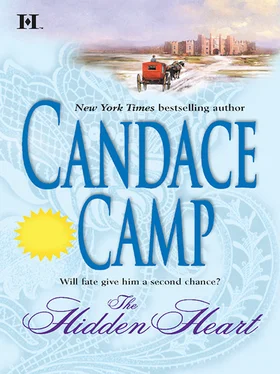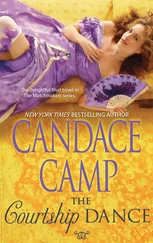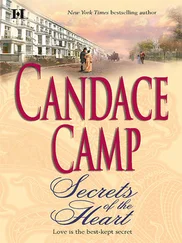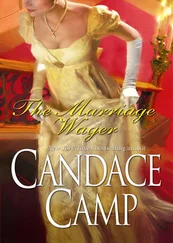“They were in a carriage accident. The duchess and the little one were killed.”
“Oh, how awful.”
The housekeeper nodded, her eyes filling with tears as she remembered. “His Grace was riding outside the carriage. It was winter, before Christmas, right about this time of year, in fact.” She sighed. “They were probably driving too fast. Anyway, the carriage overturned as they took a corner. It rolled down an embankment, and the duchess was thrown out. Her neck was broken, and she died instantly. But the carriage, with the wee one inside, rolled on down into the pond.”
Jessica drew in her breath sharply in horror. “Oh, no! How awful!”
“There was a thin layer of ice on the top of the pond, but of course the coach broke right through. His Grace went in after her. The coachman said it was a pitiful sight, how he dived again and again into the cold dark water. Finally, he brought her up and carried her onto land, but it was too late. The poor sweet child was dead.”
Sympathetic tears welled in Jessica’s eyes as she thought about the horrific scene—the frantic parent, the frozen pond, the dark, icy night. She could imagine the overturned carriage, the frightened horses, the beautiful woman dead on the ground, and the duke throwing himself into the icy water in a desperate search for his child, emerging at last with her still form.
“He carried that child in his arms all the way home, and when he walked through the door, holding her—I’ll never forget his face that night. I’ve never seen anything as bleak. We could hardly pry the child out of his arms and bundle him off to bed himself. He came down with a terrible fever—it was no wonder, him being in that icy water and then in freezing weather all the way home—and he nearly died himself. His valet, Noonan, and Baxter and I took care of him. For days we thought we were going to lose him, too, and then it was still more weeks before he was well. He was so gaunt you would hardly recognize him, and that’s a fact. He aged years in those weeks.”
“Poor man.” However much he had angered Jessica, her heart was wrung with pity for him. He had suffered terribly—the loss of a beloved spouse was sad enough, but to have had his adored daughter taken at the same time seemed almost too much to bear.
“Yes.” The housekeeper heaved a sigh and leaned forward to replenish their cups with tea. After a moment, she went on. “After that he changed. Not just the way he looked. The way he was. At first he just sat in his chair and stared out the window. Didn’t seem to care whether he lived or died. He would hardly see anyone—wouldn’t let the vicar anywhere near him, and he barely tolerated the doctor. The only one who had much luck with him was Lady Westhampton, his wife’s sister. He would see the duchess’s brother, as well, Lord Ravenscar. The only place he would go was to the graveyard. It was terrible…terrible…. We were all so worried about him. Finally, one day, he told us he was going back to London. We were happy, thinking he had decided to get on with his life.” She paused, and tears glinted in her lively brown eyes.
“But he had not?” Jessica prompted gently after a moment.
The housekeeper shook her head. “Later he told his valet that it was just that he could not bear to live in this house any longer. It’s his ancestral home—it has been the seat of the Dukes of Cleybourne since 1246. And he lived in it his whole life. But he hasn’t been home for almost four years.”
“But surely he has gotten out more, living in London. He has lived a fuller life, even if he could not face this house.”
“No. I only wish he had. Baxter writes to me every month with news about His Grace and the household. You see, only a skeleton staff and I stayed here. Most of the staff went with him, so we are always eager for news of the rest.” She smiled. “We are close, a kind of family, you see. So I write to Baxter and he to me, and we share the news with the others. The sad truth is that for all that time His Grace has been a recluse in London as much as he ever was here. He sees his relatives and friends every once in a while—if they come to visit him. He never calls on others, and he does not attend parties. Baxter says he never even visits his club. He has shut himself off from the world. And Lady Westhampton, the Duchess’s sister, is worried about him. She has told Baxter that lately he has seemed even more melancholy. Of course, this time of year is the worst for him.”
“But he came back here,” Jessica pointed out. “Surely that is a good sign.”
“We hoped so. I was very cheered. But he—well, he is as polite and nice as ever, but there is a a sadness to him that just hurts my heart to see. Sometimes I worry about why he came home now.”
“What do you mean?”
The other woman frowned. “I’m not entirely sure, miss. But it being this time of year and all…I can’t help but think, maybe he’s come home to die.”
“To die!” Jessica raised her eyebrows in surprise. “But he is still a young man. He can’t be forty yet.”
“No, miss. He’s thirty-five is all. But…”
“Surely you don’t mean—” Jessica looked shocked. “Do you actually think he might intend to…to harm himself?”
Her companion looked even more troubled. “I don’t know. I don’t want to think so. He’s a strong man, but sometimes I fear that he has given in to despair. I think perhaps he hoped that one day, being in London, away from here, he would begin to heal his sorrow. Maybe he has become so heartsore that he fears he never will. I think Lady Westhampton feared it. She cautioned Baxter to look after His Grace carefully. Not, of course, that he would ever have done any less than that, and her ladyship knows it. It was a sign of her worry about him.”
She sighed, then shook her head firmly. “No, I will not think that. But, you see, that is why I was so happy to hear this morning that you and the young miss had arrived. I thought, a child in the house is just what he needs. She will bring life to the place again, and laughter. But when you told me that he would not keep her, would not even see her…” Again she sighed. “Ah, me, it’s a sad, sad thing. I think he must feel that he cannot bear to see a child here. Miss Gabriela is older than his own little one would have been, but still, it would be a reminder to him of all that he has lost.”
“Then that is why he wants to find someone else to take her guardianship from him. I am sorry. I misjudged him.” Jessica frowned. “Poor man. I thought him simply grim and unsociable. I had no idea such loss lay at the base of his actions.”
She thought back to the duke’s sharply carved face—the jutting lines of cheekbone and jaw, almost gaunt in their severity, the dark, brooding eyes, the taut lines of his body—and she could see now the sorrow that lay behind those things.
“It is too bad that he has decided to turn Gaby away,” Jessica went on. “I think you are right. She might be just the thing he needs in his life.” She sighed. “Ah, well, I shall just have to explain it to Gaby as best I can.”
After Jessica left the housekeeper’s room, she walked into the Great Hall, the large area that ran back through the middle of the house from the front door, centered by the staircase. It was two stories high and had been the main room of the castle back in its early days. It was here that the housekeeper had said the late duchess’s portrait hung.
Obviously the first few pictures were not of her, for they were of men in the attire of Tudor and Stuart times. She came upon a painting of a woman in a high white-powdered wig, and then, just beyond that, was a portrait of a young woman in modern dress. Jessica stopped, sure that this must be the duke’s Caroline. She was beautiful, even allowing for the flattering nature of most portraits. Tall and slender, she smiled invitingly out at the viewer. There was a dimple in one cheek, and her green eyes twinkled. She stood beside a chair, one slender hand resting upon its back, and at her feet sat a toy spaniel, its black-and-white coloring reflecting the coal-black of the woman’s hair. She was dressed in green velvet that emphasized her large eyes, and a magnificent emerald ring glowed on her finger.
Читать дальше












